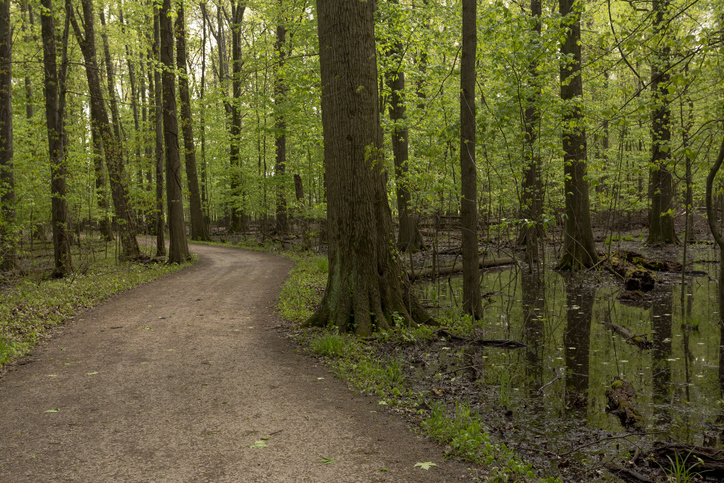The Timber Industry’s Takeover of Rhode Island’s Environmental Movement
June 5, 2023
While Rhode Island has always been pro-management (logging), this newest conspiracy begins back in 2013 with the creation of the Rhode Island Woodland Partnership. While it claims to be many things, the Rhode Island Woodland Partnership’s main aim is to expand the timber industry in Rhode Island. Thus begins the timber industry’s takeover of Rhode Island’s environmental community.
The name “Woodland” itself is revealing; “Wood” lands are meant to supply wood — logged trees — not conserve forests. “Woodlands” are the opposite of conserved forests.
Conservation protects “natural forests” so that all natural varieties of trees and plants can live together as nature intended, with many of the trees growing to be three or more centuries old.
The co-founder of the Woodland Partnership is a forester who was one of the leading pro-logging foresters in Connecticut who promoted logging to create unnatural “early successional habitat,” otherwise known to the public as clearcuts. He also used to work for at least two lumber companies. This individual is now co-chair of the Woodland Partnership and a member of the Rhode Island Forest Conservation Commission, which we will get to later.
The original partners of the Woodland Partnership were the Rhode Island Department of Environmental Management, the University of Rhode Island, the Rhode Island Resource Conservation and Development Areas Council, the Rhode Island Forest Conservators Organization, and the Natural Resources Conservation Service. Soon after, all the major statewide conservation groups joined the Woodland Partnership, including The Nature Conservancy, the Audubon Society of Rhode Island, the Rhode Island Land Trust Council, and the Rhode Island Natural History Survey.
This year, the Rhode Island Tree Council and Save The Bay joined, completing the timber industry’s takeover of the state’s environmental groups. However, not all of the boards of these environmental groups were made aware of or approved of joining the Woodland Partnership, such as the Rhode Island Tree Council.
Proof of the Woodland Partnership’s pro-logging goals can be found in its recently published strategic plan. “The RIWP will identify barriers and improve opportunities for forest-related businesses.” The plan notes:
Activity: Ensure forest-related industries have economic parity with agriculture to ensure that woods operators have the same benefits as farmers.
Resources: Farm, Forest & Open Space current use tax law, state laws that pertain to agricultural benefits, Economic Impact of RI’s Forestry and Wood Products Sector report, RI Wood Operators Organization.
Activity: Prioritize the marketing and promotion of local forest products.
Resources: PR intern, RIWP Coordinator, RI Wood Operators Organization.
In 2021, the Forest Conservation Act was introduced in the General Assembly on behalf of the Woodland Partnership and passed into law. This act would create a Forest Conservation Commission, which would lead conservation efforts in the state. Well, that is what they want the public to believe. The real purpose of the Forest Conservation Act is to create a commission that would help expand the timber industry in Rhode Island.
This is evident in the language of the Forest Conservation Act, where it says “(c) Therefore, the general assembly establishes a forest conservation commission to be coordinated and staffed by the department of environmental management to implement the following objectives: … 4) Help to increase and create new markets for Rhode Island forest products to store carbon long-term and create new jobs; (5) Assess impediments to the expansion of the Rhode Island forest products industry and recommend changes to remove impediments.”
The individual who wrote the 2021 Forest Conservation Act is an active member of the Woodland Partnership who is now the chair of the Rhode Island Forest Conservation Commission. This language is no accident, nor is it an accident that almost the entire membership of the Forest Conservation Commission are active members of the Woodland Partnership.
The Forest Conservation Commission wasn’t created with its main purpose being conservation. It was created to expand the timber industry in Rhode Island. This year, a bill was introduced (H5784A), which would remove the sales tax for forest products. It would lead to the expansion of the timber industry by providing incentives for increased logging in the state.
In the entire session, the Forest Conservation Commission only supported one bill. Not a conservation bill, but H5784A, the timber industry’s logging expansion bill.
In written testimony, submitted by the commission’s chair who wrote the Forest Conservation Act passed two years before, the commission noted it “strongly supports” the bill. The letter goes on to state, “The RI Forest Conservation Commission believes it is necessary to help expand the forest products industry by providing these professionals with the same benefits currently being used to assist agricultural operators.”
The Woodland Partnership is the timber industry’s environmental front, and the Forest Conservation Commission is the timber industry’s government arm.
DEM worked behind the scenes in support of the bill, as the agency’s deputy chief forester worked to get support for H5784A from foresters and arborists.
Another organization that supports H5784A is the Audubon Society of Rhode Island, a member group of the Woodland Partnership. Furthermore, the individual who stated their support on behalf of the organization is a member of the Forest Conservation Commission and the president of the Environmental Council of Rhode Island.
A look at the membership of the Forest Conservation Commission, the active members of the Woodland Partnership, and the board and staff of different statewide environmental groups, reveals many of the same pro-logging “environmentalists” in multiple key positions.
Logging doesn’t help forests; it degrades them by causing our forests to have less native biodiversity, allows invasives to spread, makes the forest more susceptible to wildfires and brush fires, has a negative affect on water quality, and releases most of the carbon stored in the forest into the atmosphere as air pollution contributing to climate change.
H5784 would be a gross violation of the 2021 Act on Climate law, which mandates net-zero carbon emissions by 2050.
Rhode Island is the only New England state where there are no forests on public land protected from logging. Therefore, old-growth forests and habitats where rare and endangered species live are vulnerable on public land and will be even more at risk if H5784A is passed into law.
The Forest Conservation Commission is falsely named; it is actually a forest destruction commission, or Deforestation Commission, whose aims are to supply wood by destroying forests instead of conserving nature and natural forests.
George Orwell predicted government institutions, in this case the so-called Forest Conservation Commission, which have names that are the exact opposite of what the institution actually does.
Warwick, R.I., resident and 2020 University of Rhode Island graduate Nathan Cornell is the co-founder and president of the Rhode Island Old Growth Tree Society. He can be contacted at [email protected].
The views expressed in this opinion piece do not reflect those of ecoRI News and its board of directors.
Categories
Join the Discussion
View CommentsRecent Comments
Leave a Reply
Your support keeps our reporters on the environmental beat.
Reader support is at the core of our nonprofit news model. Together, we can keep the environment in the headlines.
We use cookies to improve your experience and deliver personalized content. View Cookie Settings




Having much experience with the timber industry in New England I think Nathan misses the nuance and complexity of the issues. Maybe he and I need to look at the most recent USFS analysis of the RI forest.
I dont think we should be cutting down anymore trees.Trees store carbon so that we can breath clean air.Rhode Island is a beautiful state with lots of open space..let’s leave it that way..We can recycle what we already have.I am totally against this bill..
Does the author not understand how a degraded forest may need active management to be improved (through stand improvement practices)? Or an awareness of the timeline of these practices? A single property wont be logged every single year. A lot of these practices work on 10 to 15+ year time frames.
“Logging doesn’t help forests; it degrades them by causing our forests to have less native biodiversity, allows invasives to spread, makes the forest more susceptible to wildfires and brush fires, has a negative affect on water quality, and releases most of the carbon stored in the forest into the atmosphere as air pollution contributing to climate change.”
I’d very much like to hear the authors reasons as to why he believes these negative effects because they seem to be coming from a place of misinformation and a lack of basic ecological knowledge.
Where’s the name slinging? Was expecting more accountability in the mention of names in the article. After all, it’s those people who likely benefit the most from the activity, forest loss and mismanagement.
Are all if the environmental groups that supposedly signed on to this aware of what this legislation actually entailed. The makeup of the commission is tilted to the forestry industry.
I agree that forest need to be culled to remove unhealthy trees and to thin them making way for healthy growth.
That isn’t accomplished by clear cutting. I feel that this legislation gives the timber industry free reign to decimate our forests even old growth forests and apply for grants to aid them in their destruction. one section of this law allows the members if the commission to accept gifts?
Before these forestry industry people destroy our forests irreparably Please repeal this legislation.
I don’t think our.legislators read thus bill but voted in it because of a bill of goods they were spoon fed.
Please read
https://harvardforest.fas.harvard.edu/sites/default/files/Foster_ConservationBio_2006.pdf
and
https://theconversation.com/native-people-did-not-use-fire-to-shape-new-englands-landscape-129429,
also see
https://wildlandsandwoodlands.org/resources/wildlands-in-new-england/
In addition, I suggest you look into the work of Dr. William Moomaw, who served on the IPCC and the work of Woodwell Climate Senior Scientist, Dr. Richard Birdsey. For further reading, google The Highstead Foundation. Forest in New England, with minor exceptions, do better when they are left alone.